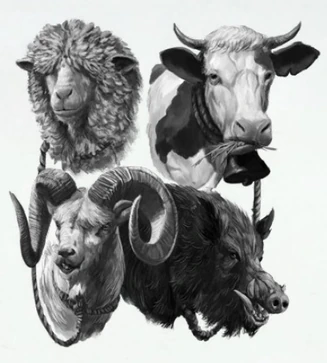
Sheep, cow, goat and pig
Livestock serve two purposes: labour and food. They are wholly unsuitable in combat, as they are not trained for battle. Anytime they encounter something frightening like fire, loud noises, or the smell of blood, they flee unless they can be calmed. Finally, some of these animals may be ridden, such as the various horses, donkeys, and mules, but with more difficulty than other, more normal mounts.[1a]
Notable Livestock[]
- Chicken - Chickens are a staple food source in the Old World, both for the eggs they lay and the meat on their bones. Chickens have negligible characteristics.[1a]
- Cow - Cows are valued more for their milk than their flesh. For most peasants, beef is a rare luxury.[1a]
- Donkey - These cantankerous beasts are stubborn, wilful, and generally unpleasant. Still, they are cheaper than horses and can be used for labour or as pack animals, and are otherwise similar to ponies.[1a]
- Draft Horse - Draft horses are specially bred for labour, such as pulling ploughs, wagons, or carts, and are otherwise similar to a light warhorse.[1a]
- Goat - Valued for their milk and their ability to clean up rubbish, goats are nearly as common as chickens in the Old World. Goats have negligible characteristics.[1a]
- Mule - A mule is what you get when a donkey and a horse have a romantic encounter. Mules make ideal draw or pack animals. They are others similar to a riding warhorse.[1a]
- Ox - Oxen are incredible beasts of burden and are used mostly as dray animals. They are similar to a light warhorse, albeit slower.[1a]
- Packhorse - Travellers often use packhorses to carry equipment.[1a]
- Pig - Like goats, pigs are fantastic at cleaning up waste and producing fertilizer.[1a]
- Sheep - Sheep provide wool, one of the most common materials for clothing. As a result, these animals are widespread; though the majority of them are found in Estalia and Bretonnia.[1a]
